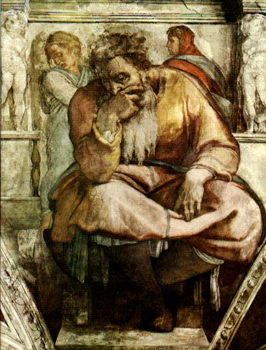For Sunday August 14, 2016
Lectionary Readings (Revised Common Lectionary, Year C)
Isaiah 5:1–7 or Jeremiah 23:23–29
Psalm 80:1–2, 8–19 or Psalm 82
Hebrews 11:29–12:2
Luke 12:49–56
"Open up the book of Jeremiah," wrote Daniel Berrigan, "and you do not find a person looking for inner peace." Rather, Jeremiah earned the moniker of "the weeping prophet" for his life of grief over his wayward people: "Oh, that my head were a spring of water / and my eyes a fountain of tears! / I would weep day and night / for the slain of my people."
Jeremiah echoes the poetry of the psalmist for this week — namely, that the people of God regularly experience the "bread of tears" and "tears by the bowlful."
God called Jeremiah to speak to the religious and political leaders of his country — their prophets, priests and king. The collateral reading this week from Jeremiah 23:23–29 is only a snippet from a longer section that in my Bible is entitled "Lying Prophets," which reminds me of the comedian Al Franken's book, Lies and the Lying Liars Who Tell Them. Only in this instance, nobody was laughing.
Like his cohort Amos, and with similar results, Jeremiah preached an unpatriotic, seditious, and judgmental message: "Stop feeding our people reckless lies and false hopes. Stop betraying them with your delusional messages of comfort and hope. National disaster is upon us."
With biting irony and bitter sarcasm, Jeremiah compared Judah's false prophets to the pagan predictors of Baal. Their worship was worse than Samaria, their actions more evil than Sodom.
 |
|
Jeremiah from Michelangelo's Sistine Chapel.
|
He ridiculed their pseudo-prophecies as "false hopes" and "reckless lies" (23:16, 32). Like a "false dream" (23:32), they assured Judah that everything was fine, when in fact they were about to awaken to a nightmare of national destruction. To speak so bluntly, wrote Jeremiah, made his heart break and his bones tremble (23:9).
And what was the national response to this prophetic word? A collective yawn. Nobody listened. Nothing changed. The status quo stood firm. The people despised the man and his message. And so the prophets, observed Berrigan, "press on through a trackless thicket of adverse will," and pay a "hefty price" for their ominous call.
For his twenty-three years of faithfulness to God's call (25:3), Jeremiah experienced indifference and hatred. He was beaten (20:2), received death threats (26:8), imprisoned (37:15), thrown down a well (38:6), and derided as an unpatriotic crank and traitor. Inner peace? Hardly.
But history proved him right. In 586 BC, Babylon ravaged Judah and Jerusalem, just like Jeremiah had warned, and despite all the reckless lies and false comforts of the nation's leaders.
The message of the false prophets was one of self-aggrandizement and denial: "You will have peace; no harm will come to you!" (23:17). Or in modern parlance, "our nation is an exceptional people, special to God and his purposes, so he will protect us."
For Jeremiah, this was a political problem of national proportions — the very survival of Israel was at stake. Anyone from any nation today might legitimately draw parallels to their own country, and expose the comforting myths and "reckless lies" told by its leaders to lull its citizens. But don't expect people to thank you for that.
 |
|
Icon of Jeremiah.
|
The gospel for this week similarly belies false prophecies of personal peace. "Do you think I came to bring peace on earth?" asked Jesus. "No, I tell you, but division. From now on there will be five in one family divided against each other, three against two and two against three."
So too the epistle for this week. Hebrews 11:29–12:2 is just the medicine I need to combat the sickness that Jeremiah diagnosed. Normally, I read Hebrews 11 as faith's hall of fame. True, it speaks of saints who did exploits for God, "conquering kingdoms, shutting the mouths of lions, and quenching the fury of flames" (11:33–34).
But when I read more closely and carefully, I discovered a different category of saints. Alongside these mighty saints who "gained what was promised" (11:33), there are many saints who "did not receive what had been promised" (11:13, 39). They received something far different.
Here's how Hebrews describes them: "Others were tortured… some faced jeers and flogging, while still others were chained and put in prison. They were stoned; they were sawed in two; they were put to death by the sword. They went about in sheepskins and goatskins, destitute, persecuted and mistreated — the world was not worthy of them. They wandered in deserts and mountains, and in caves and in holes in the ground. These were all commended for their faith, yet none of them received what had been promised." (11:35–39).
 |
|
Jeremiah lamenting the destruction of Jerusalem, by Rembrandt.
|
These saints would have known what Jeremiah meant about false hopes and reckless lies about personal peace and national safety; they would not have equated or confused their personal fortune with their Christian faith. Nor is this description from Hebrews an exaggeration; it could easily describe life under Nero or Diocletian, Hitler, Stalin or Mao, Mugabe or Assad.
Similarly, the apostle Paul confessed to the Corinthians that he lived a life of "conflict without, fears within."
Berrigan cautions against a spirituality of personal equanimity. "To the prophets of the Bible," he writes, "that would have been an absolutely foreign language and a foreign view of the human."
"Jeremiah goes through the mountains and the valleys. That kind of richness I find very appealing, whereas the kind of spirituality that looks for a flat emotional landscape brought on by the endless search for inner peace and equanimity I find disturbing, a quest that goes nowhere."
No image credits available.



